Should you buy Google reviews? Unfortunately, the trend is on the rise.
Almost 82% of consumers have read a fake online review in the last year. According to research, 92% of consumers in the 18 to 34-year-old bracket have seen a fake online review in the last year.
If you can’t beat them, maybe you should join them?
This is a terrible idea.
In this post, I’ll show you why you shouldn’t buy Google reviews and the consequences of paying for reviews (if you do). I’ll also show you a simple alternative you can use to substantially boost the number of four and five-star reviews you receive.
Why do businesses buy Google reviews?
Businesses buy reviews for a variety of reasons. These reasons aren’t justifications for fraudulent reviews; however, they help us better understand why companies are willing to buy reviews.
- Competitors are doing it.
- Competitors are paying customers to write negative reviews about you.
- Your business needs to dig itself out of a reputation black hole.
- Your industry is hyper-competitive.
- It's easier than asking for legitimate reviews.
These aren’t justifications.
If you’re desperate to keep your business afloat or a dodgy competitor is destroying your reputation, it’s especially tempting to buy reviews.
What does this mean?
A crisis increases the temptation business owners feel about paying for online reviews. Maybe this isn’t so bad — other companies seem to pull it off.
Why you shouldn't buy Google reviews
These requests are common.
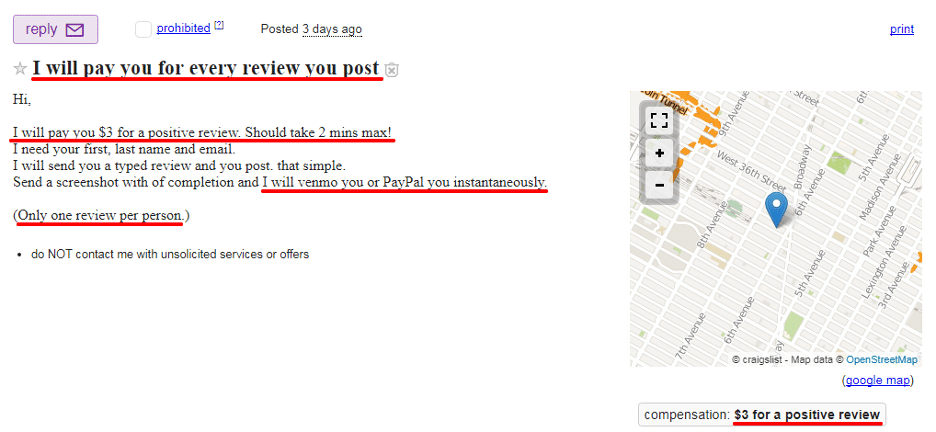
Businesses reach out to “reviewers” covertly using platforms like Craigslist or Fiverr to recruit paid shills. Some of these “reviewers” receive the product or service being reviewed, but most, like the example above, do not.
What’s the harm?
Well, for starters, buying Google reviews violates their review guidelines.
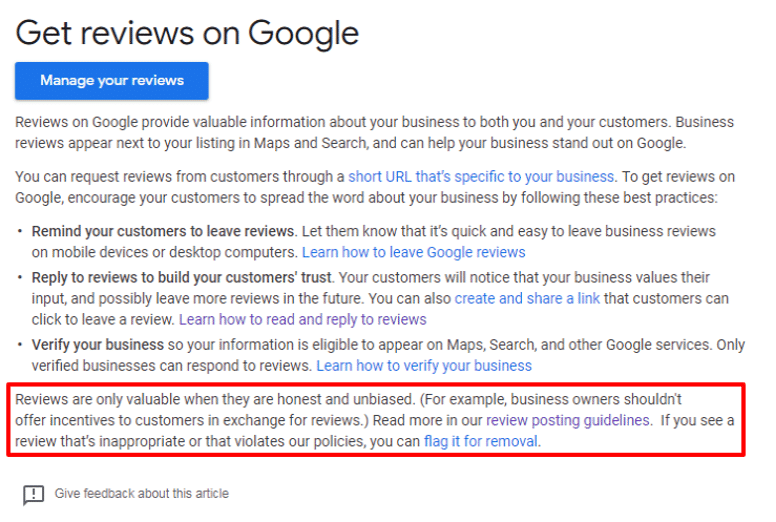
They also list spam and fake reviews in their “prohibited and restricted content” policy.
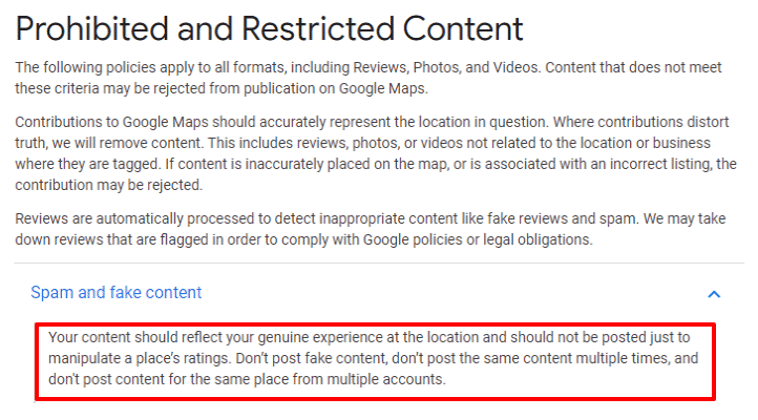
Google makes it clear.
Buying reviews is a violation of their policies; this means Google will remove any (all) of the reviews you’ve paid for and terminate your account if you’re a repeat offender. This would significantly impact your local search rankings, the traffic you receive, and ultimately, your conversion rate.
Next, there’s the damage to your reputation.
Customers have gotten better at spotting fake reviews. They rely on heuristics to verify the trustworthiness of individual reviews and company review profiles. These criteria include:
- Review content and style
- Reviewer profiles and profile history
- Content patterns
- Valence and extremity
Why is this important?
Synthetic (fake) reviews don’t have these ingredients. When you pay for reviews, it’s unlikely that you’ll receive a quality review that checks all of the right boxes in your customer’s head. It’s far more likely that customers will sense that something is off about your review portfolio.
Your conversion rate will suffer.
But that only happens if you’re caught, right? This scenario is far more likely than many businesses are willing to admit. One disgruntled employee is all it takes to destroy your reputation. Here, let me show you what I mean.
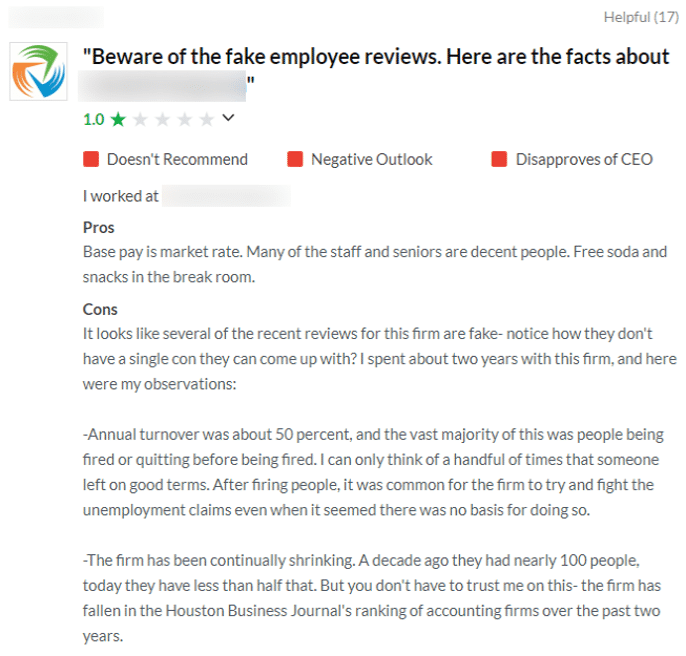
Your employees, tell everyone via sites like Glassdoor.
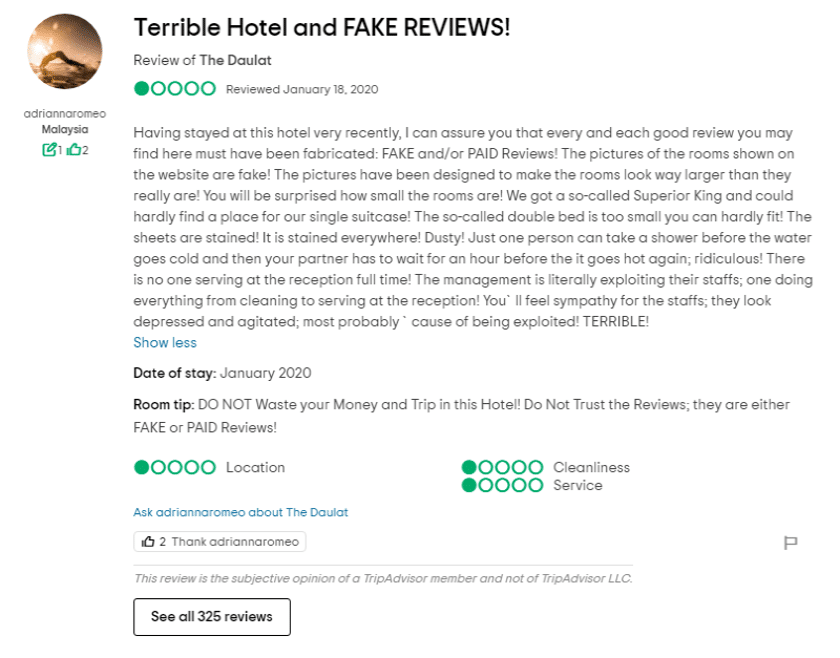
Or legitimate customers, who have worked with your business, will blow the whistle on your company, scaring future customers away.
This is the problem with paid reviews.
Once you’re outed, your customer’s willingness to trust any of your reviews goes right out the window. You permanently destroy your review profile across several sites. Once outed, your reviews will always be viewed as questionable, even if you decide to play it straight and focus on legitimate reviews.
Break trust with customers and risk of permanently destroying your business.
Finally, there’s the law.
According to Section 5 of the FTC Act 15 U.S. Code § 45, fraudulent or deceptive reviews (testimonials) are illegal. The FTC aggressively pursues companies that use fake paid reviews to promote their business. If they catch you, you’ll be fined a minimum of $10,000 per review.
The FTC actually provides businesses with a helpful guide regarding endorsements and testimonials.
Maybe you’re too small to be caught?
That assumption would be a mistake as the FTC pursues large and small companies, as seen in their case against Cure Encapsulations in 2019. The FTC imposed a judgment of $12.8 million.
Can the average small business survive that?
Probably not.
Here’s the thing about these consequences. They’re not one-offs; you can be hit with all of these if you decide to buy Google reviews.
Are incentives viewed the same as buying Google Reviews?
In a previous post, Garrett mentioned that incentives introduce their own sets of unnecessary problems. Problems like:
- Customers who adopt a mercenary mindset where they're focused on doing what they need to do to get the incentives you offer.
- Customer predators who are focused on taking as much as they can from you whenever they can, without giving in return.
- Review incentives that change customer perceptions; if the incentive isn't what customers expected, they can develop negative perceptions about your business.
- Review site incentives that dictate what you offer and the way you can implement them.
With this in mind, here’s how Google feels about incentives.
“Reviews are only valuable when they are honest and unbiased. (For example, business owners shouldn’t offer incentives to customers in exchange for reviews.) Read more in our review posting guidelines. If you see a review that’s inappropriate or that violates our policies, you can flag it for removal.”
What does this mean?
Google doesn’t like incentives. Greg Sterling explains why incentives are a bad idea.
“The Winton & Hiestand Law Group, had the vast majority of its reviews on Google removed after it was discovered that the firm was incentivizing people to review the business with contests and giveaways.”
How do you generate reviews in bulk if Google frowns on incentives?
Alternatives to buying Google reviews
If you’re not allowed to buy reviews, and you’re not allowed to incentivize customer reviews, what can you do to generate reviews in bulk?
It’s easy, you ask.
You start by creating a review request campaign that’s tailored specifically to customers. This campaign isn’t a broadcast that’s used to spam your email list. It’s a thoughtful campaign sent out to specific customers at the end of the product or service lifecycle.
This campaign allows customers to self-identify.
If they’re interested in sharing their feedback with you, they’ll stay in your review funnel until they complete the review process. If your customers aren’t interested, they’ll leave your review funnel.
How would this work?
The process is straightforward.
- Curate a list of customers who are approaching the end of the purchase lifecycle.
- Create and customize review request templates.
- Create a review request campaign that’s tailored around specific customer segments.
- Send messages to customers.
Not sure where to start?
Here are some comprehensive guides you can use to earn Google reviews at scale.
- Google reviews: how to get Google reviews, manage reviews, and market reviews
- 44 Unique Email Templates for Requesting Online Reviews
- 40 Situational SMS Templates For Requesting Reviews
- 60 Review Request Text Templates To Get Google Reviews
- How to send out review request campaigns using Grade.us
- How to send out review requests using Grade.us
- How do I send out a review request via text message?
If you’re using a review management tool like Grade.us, you have everything you need to request reviews at scale while also staying within Google’s guidelines.
What if your competitors are buying Google Reviews?
It would be naive to believe that all of your competitors would play fair.
Some probably won’t.
They may play dirty; they may decide to focus their attention on buying Google reviews to benefit themselves or hurt you. At first, it may seem as if their strategy is working, as if they’re generating the kind of traction they need to surpass you.
Don’t take the bait.
Instead, ramp up your efforts with legitimate review management campaigns of your own. Work with partners to attract more customers. Work with customers to improve the customer experience. Make the conversation an iterative one where customers see they have a voice with you.
Why is this strategy superior?
If your competitors buy Google reviews, and they get past Google’s filters, they win reviews. If you improve the customer experience and earn legitimate reviews, you earn evangelists.
Who wins in the long run?
You do. Stay the course, and you’ll create an army of customer evangelists who will go out and recruit more customers (and reviews) for you.
You don't have to buy Google reviews to beat your competitors
If you can’t beat your competitors, talk to your customers.
Research shows fake reviews are on the rise. Your competitors are spending more of their time and money on illegitimate reviews. Do you need to buy reviews to compete? Not at all; you shouldn’t buy Google reviews — the returns are low, the consequences too high.
There’s a better way.
Just ask for the feedback you need. Use review requests to substantially boost the number of four and five-star reviews you receive. It’s simple and scalable, and it provides you with the exponential growth you need to surpass your competitors.
Don’t buy Google reviews to survive a crisis; turn to your loyal customers — ask them for the support you need, and you’ll find you have everything you need to beat the competition.










